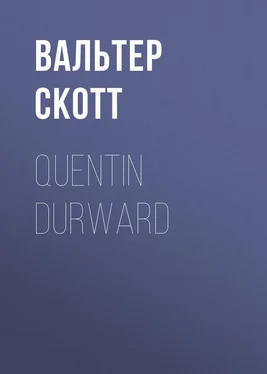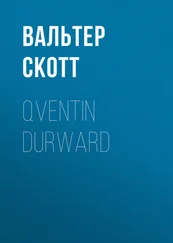Вальтер Скотт - Quentin Durward
Здесь есть возможность читать онлайн «Вальтер Скотт - Quentin Durward» — ознакомительный отрывок электронной книги совершенно бесплатно, а после прочтения отрывка купить полную версию. В некоторых случаях можно слушать аудио, скачать через торрент в формате fb2 и присутствует краткое содержание. Жанр: foreign_antique, foreign_prose, Альтернативная история, на английском языке. Описание произведения, (предисловие) а так же отзывы посетителей доступны на портале библиотеки ЛибКат.
- Название:Quentin Durward
- Автор:
- Жанр:
- Год:неизвестен
- ISBN:нет данных
- Рейтинг книги:3 / 5. Голосов: 1
-
Избранное:Добавить в избранное
- Отзывы:
-
Ваша оценка:
- 60
- 1
- 2
- 3
- 4
- 5
Quentin Durward: краткое содержание, описание и аннотация
Предлагаем к чтению аннотацию, описание, краткое содержание или предисловие (зависит от того, что написал сам автор книги «Quentin Durward»). Если вы не нашли необходимую информацию о книге — напишите в комментариях, мы постараемся отыскать её.
Quentin Durward — читать онлайн ознакомительный отрывок
Ниже представлен текст книги, разбитый по страницам. Система сохранения места последней прочитанной страницы, позволяет с удобством читать онлайн бесплатно книгу «Quentin Durward», без необходимости каждый раз заново искать на чём Вы остановились. Поставьте закладку, и сможете в любой момент перейти на страницу, на которой закончили чтение.
Интервал:
Закладка:
The flourish of trumpets in the courtyard now announced the arrival of the Burgundian nobleman. All in the presence chamber made haste to arrange themselves according to their proper places of precedence, the King and his daughters remaining in the centre of the assembly.
The Count of Crevecoeur, a renowned and undaunted warrior, entered the apartment; and, contrary to the usage among the envoys of friendly powers, he appeared all armed, excepting his head, in a gorgeous suit of the most superb Milan armour, made of steel, inlaid and embossed with gold, which was wrought into the fantastic taste called the Arabesque. Around his neck and over his polished cuirass, hung his master’s order of the Golden Fleece, one of the most honoured associations of chivalry then known in Christendom. A handsome page bore his helmet behind him, a herald preceded him, bearing his letters of credence which he offered on his knee to the King; while the ambassador himself paused in the midst of the hall, as if to give all present time to admire his lofty look, commanding stature, and undaunted composure of countenance and manner. The rest of his attendants waited in the antechamber, or courtyard.
[The military order of the Golden Fleece was instituted by Philip the Good, Duke of Burgundy, in the year 1429, the King of Spain being grand master of the order, as Duke of Burgundy.]
“Approach, Seignior Count de Crevecoeur,” said Louis, after a moment’s glance at his commission; “we need not our cousin’s letters of credence, either to introduce to us a warrior so well known, or to assure us of your highly deserved credit with your master. We trust that your fair partner, who shares some of our ancestral blood, is in good health. Had you brought her in your hand, Seignior Count, we might have thought you wore your armour, on this unwonted occasion, to maintain the superiority of her charms against the amorous chivalry of France. As it is, we cannot guess the reason of this complete panoply.”
“Sire,” replied the ambassador, “the Count of Crevecoeur must lament his misfortune, and entreat your forgiveness, that he cannot, on this occasion, reply with such humble deference as is due to the royal courtesy with which your Majesty has honoured him. But, although it is only the voice of Philip Crevecoeur de Cordes which speaks, the words which he utters must be those of his gracious Lord and Sovereign, the Duke of Burgundy.”
“And what has Crevecoeur to say in the words of Burgundy?” said Louis, with an assumption of sufficient dignity. “Yet hold – remember, that in this presence, Philip Crevecoeur de Cordes speaks to him who is his Sovereign’s Sovereign.”
Crevecoeur bowed, and then spoke aloud: “King of France, the mighty Duke of Burgundy once more sends you a written schedule of the wrongs and oppressions committed on his frontiers by your Majesty’s garrisons and officers; and the first point of inquiry is, whether it is your Majesty’s purpose to make him amends for these injuries?”
The King, looking slightly at the memorial which the herald delivered to him upon his knee, said, “These matters have been already long before our Council. Of the injuries complained of, some are in requital of those sustained by my subjects, some are affirmed without any proof, some have been retaliated by the Duke’s garrisons and soldiers; and if there remain any which fall under none of those predicaments, we are not, as a Christian prince, averse to make satisfaction for wrongs actually sustained by our neighbour, though committed not only without our countenance, but against our express order.”’
“I will convey your Majesty’s answer,” said the ambassador, “to my most gracious master; yet, let me say, that, as it is in no degree different from the evasive replies which have already been returned to his just complaints, I cannot hope that it will afford the means of re-establishing peace and friendship betwixt France and Burgundy.”
“Be that at God’s pleasure,” said the King. “It is not for dread of thy master’s arms, but for the sake of peace only, that I return so temperate an answer to his injurious reproaches. Proceed with thine errand.”
“My master’s next demand,” said the ambassador, “is that your Majesty will cease your secret and underhand dealings with his towns of Ghent, Liege, and Malines. He requests that your Majesty will recall the secret agents by whose means the discontents of his good citizens of Flanders are inflamed; and dismiss from your Majesty’s dominions, or rather deliver up to the condign punishment of their liege lord, those traitorous fugitives, who, having fled from the scene of their machinations, have found too ready a refuge in Paris, Orleans, Tours, and other French cities.”
“Say to the Duke of Burgundy,” replied the King, “that I know of no such indirect practices as those with which he injuriously charges me; that many subjects of France have frequent intercourse with the good cities of Flanders, for the purpose of mutual benefit by free traffic, which it would be as much contrary to the Duke’s interest as mine to interrupt; and that many Flemings have residence in my kingdom, and enjoy the protection of my laws, for the same purpose; but none, to our knowledge, for those of treason or mutiny against the Duke. Proceed with your message – you have heard my answer.”
“As formerly, Sire, with pain,” replied the Count of Crevecoeur; “it not being of that direct or explicit nature which the Duke, my master, will accept, in atonement for a long train of secret machinations, not the less certain, though now disavowed by your Majesty. But I proceed with my message. The Duke of Burgundy farther requires the King of France to send back to his dominions without delay, and under a secure safeguard, the persons of Isabelle Countess of Croye, and of her relation and guardian the Countess Hameline, of the same family, in respect the said Countess Isabelle, being, by the law of the country and the feudal tenure of her estates, the ward of the said Duke of Burgundy, hath fled from his dominions, and from the charge which he, as a careful guardian, was willing to extend over her, and is here maintained in secret by the King of France and by him fortified in her contumacy to the Duke, her natural lord and guardian, contrary to the laws of God and man, as they ever have been acknowledged in civilized Europe. – Once more I pause for your Majesty’s reply.”
“You did well, Count de Crevecoeur,” said Louis, scornfully, “to begin your embassy at an early hour; for if it be your purpose to call on me to account for the flight of every vassal whom your master’s heady passion may have driven from his dominions, the head roll may last till sunset. Who can affirm that these ladies are in my dominions? who can presume to say, if it be so, that I have either countenanced their flight hither, or have received them with offers of protection? Nay, who is it will assert, that, if they are in France, their place of retirement is within my knowledge?”
“Sire,” said Crevecoeur, “may it please your Majesty, I was provided with a witness on this subject – one who beheld these fugitive ladies in the inn called the Fleur de Lys, not far from this Castle – one who saw your Majesty in their company, though under the unworthy disguise of a burgess of Tours – one who received from them, in your royal presence, messages and letters to their friends in Flanders – all which he conveyed to the hand and ear of the Duke of Burgundy.”
“Bring them forward,” said the King; “place the man before my face who dares maintain these palpable falsehoods.”
“You speak in triumph, my lord, for you are well aware that this witness no longer exists. When he lived, he was called Zamet Magraubin, by birth one of those Bohemian wanderers. He was yesterday – as I have learned – executed by a party of your Majesty’s Provost Marshal, to prevent, doubtless, his standing here to verify what he said of this matter to the Duke of Burgundy, in presence of his Council, and of me, Philip Crevecoeur de Cordes.”
Читать дальшеИнтервал:
Закладка:
Похожие книги на «Quentin Durward»
Представляем Вашему вниманию похожие книги на «Quentin Durward» списком для выбора. Мы отобрали схожую по названию и смыслу литературу в надежде предоставить читателям больше вариантов отыскать новые, интересные, ещё непрочитанные произведения.
Обсуждение, отзывы о книге «Quentin Durward» и просто собственные мнения читателей. Оставьте ваши комментарии, напишите, что Вы думаете о произведении, его смысле или главных героях. Укажите что конкретно понравилось, а что нет, и почему Вы так считаете.












